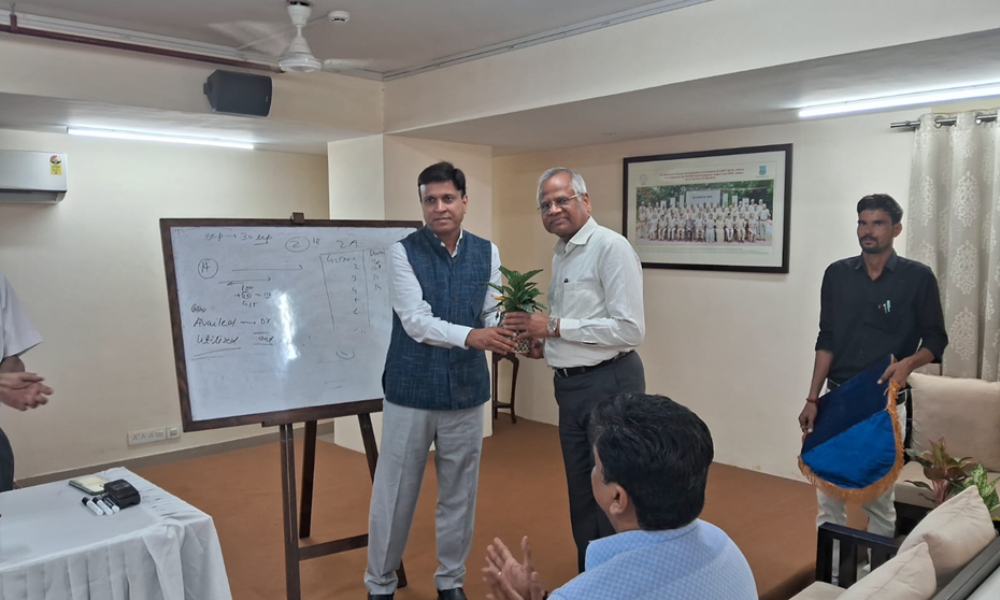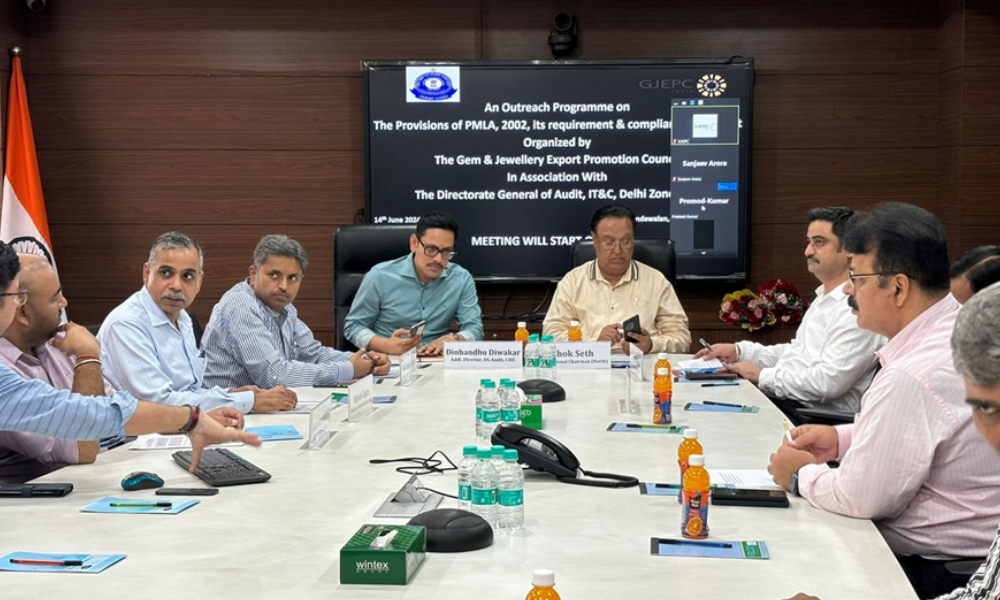The Financial Action Task Force (FATF), the global terror funding watchdog, in its latest India review report has recognised the Gem & Jewellery Export Promotion Council’s (GJEPC’s) role in enhancing Anti-money Laundering and Counter-Terrorist Financing (AML/CFT) measures among Dealers in Precious Metals and Stones (DPMS) towards maintaining the integrity of the gems and jewellery industry.
The Financial Action Task Force (‘FATF’) has issued its assessment report, analysing India’s level of compliance with the FATF recommendations and the level of effectiveness of India’s anti-money laundering (AML) / counter-terrorist financing (CTF) system, as at the time of the on-site visit of the assessment team, from 6-24 November 2023, and the same also provides recommendations on how such system could be strengthened.
Theoretical coverage under PMLA
At threshold, it must be understood that, as of date, while DMPS are included within the framework of the Prevention of Money Laundering Act, 2002 (‘the PMLA Act’), their obligation to actually register as reporting entities ideally gets triggered only if they engage in cash transaction of over INR 10 lakhs, which possibility is theoretically ruled out as the same is impermissible in view of Section 269SS of the Income Tax Act, 19611.
The report accordingly observes that such a prohibition under the Income tax laws therefore limits the extent to which Regulation 22 (customer due diligence) and Regulation 23 (other measures) of the FATF could be applied to capture DPMS activities. At the same time however, the report acknowledges that the DPMS continue to be subjected to and bound by the reporting and compliance framework under the GST laws, obtain licenses from and registrations with the office of DGFT, obtain membership of the Gem & Jewellery Export Promotion Council (‘GJEPC’), where there is involvement of cross-border trade, are also now subjected to the mandatory hallmarking framework, in accordance with the specified standards promulgated by the Bureau of Indian Standards (BIS) and continue to adhere to the Kimberly Process (KP) certification in so far as movement of rough diamonds is concerned. However, given the bar under the Income tax laws, the report pre-supposes that Regulation 22 and 23 are inapplicable to DPMS, even while, recently, the Government had introduced voluntary PMLA related guidelines for the DPMS, sometime in November 2023.
Vipul Shah, Chairman, GJEPC, said, “The GJEPC is deeply honoured for the recognition from the FATF for our commitment to strengthening India’s AML/CFT regime. Our ongoing efforts to implement robust KYC procedures and ensure compliance with regulatory standards underscore our dedication to maintaining the integrity and transparency of the gems and jewellery industry. As the gem & jewellery industry’s apex body, it is our responsibility to safeguard the sector from illicit activities by promoting a culture of compliance and ethical business practices.”
Kirit Bhansali, Vice Chairman, GJEPC, commented, “We are immensely proud of the recognition of GJEPC’s efforts in enhancing India’s AML/CFT compliance. Our commitment to maintaining transparency and integrity within the gems and jewellery sector remains constant. Our MyKYC platform and our rigorous due diligence process are key pillars in safeguarding the industry against unlawful practices. This FATF acknowledgment reaffirms our dedication to enhancing global standards and ensuring that our sector thrives responsibly.”
Kaushal Sampat, Founder, Rubix Data Sciences Pvt. Ltd., which manages the MyKYC platform, added, “The MyKYC Platform is an important initiative of GJEPC to conduct a detailed KYC check of all GJPEC applicants since these are DPMS involved in import and export trade. By leveraging GJEPC’s national presence and the latest KYC technology, the MyKYC platform undertakes rigorous identity verification processes to validate the identity of all GJEPC members. This ensures that only genuine entities receive GJEPC membership which entitles them to participate in the international trade of gems and jewellery.”
The report however does cast an aspersion over the subjectivity around application of penal consequences under the Income tax laws, where specified cash transaction limits are breached, as such penalties could be waived where there is a ‘good and sufficient reason’ for the contravention. As per the report, this “provision weakens the legal prohibition, as it is not clear how this clause may be interpreted”. The report however analyses:
“Approximately 50 DPMS were identified per year (during the period 2017-2020) not observing the prohibition, but no information was available on how many DPMS were checked to determine a compliance rate. Overall, this appears a low number given the number of DPMS in India (c. 175 000).”
The report effectively holds that “as a result of a restriction on cash transactions above a set threshold under tax law, the DPMS sector falls outside the scope of preventive measures. However, it is unclear whether the sector has been sufficiently monitored for compliance and whether the penalty provisions are dissuasive. As such, there are doubts as to whether the ML/TF risks in the sector are sufficiently mitigated by the cash threshold prohibition. This has been weighted heavily considering the size and materiality of the DPMS sector and its importance in the context of India.”
AML/CFT policies and co-ordination
With regard to the evaluation of AML/CFT policies and co-ordination, the report recommends that India should include deeper qualitative and quantitative data and typologies from domestic and international sources on the ML risks associated with precious metals and stones smuggled into and circulating in India, when undertaking future risk assessments on DPMS and gold and diamond smuggling and the associated ML risks.
Extent of supervision over DPMS
As regards extent of supervision over DPMS, the report notes that there are insufficient checks to identify criminals and their associates in the DPMS sector, despite the application of a combination of regulatory regimes.
While the report recognises that the sector falls outside the scope of preventive measures owing to operation of the Income tax laws, it highlights that there are some enforcement action challenges, raising doubts as to whether the ML/TF risks in the sector are sufficiently mitigated by the cash restriction.
The report accordingly recommends that “India should strengthen measures to prevent criminals or their associates from participating in the DPMS sector. Furthermore, India should enhance the monitoring and enforcement of the cash threshold prohibition in the sector”.
The report underscores that licensing, registration and fitness and probity checks to prevent criminals from entering the financial, VASP and DNFBP sectors are broadly adequate, but less so for some FIs in the foreign exchange and the DPMS sectors.
While acknowledging that GJEPC’s registration is mandatory, and that it has over 9500 members (c. November 2023), the report observes that such members are almost less than 8% of the DPMS businesses in India which are registered with BIS, as GJEPC membership is only required for businesses that import and export of gold and diamonds.
Be that as it may, the report duly appreciates the GJEPC’s effective measures e.g. MyKYC platform- “a global online KYC repository for gems and jewellery) and a dedicated KYC Team for vetting GJEPC applicants (normally DPMS involved in import and export), which includes virtual and location-based meetings in each region prior to granting authorisation.”
Comment: The overarching finding qua DPMS remains that, owing to the cash transaction related restriction under Income tax, they do not accurately fall within the fold of the regulatory framework under the PMLA laws. In view thereof, there is a suggestion that the monitoring and enforcement of the cash threshold prohibition in the sector should be enhanced. This could be ensured by eliminating the subjectivity around enforcement of the penal consequences under Section 271DA of the Income Tax Act, 1961.

GJEPC’s Delhi Regional Office successfully conducted an outreach seminar on the Prevention of Money Laundering Act (PMLA) 2002 in Kanpur on 22nd August, 2024. The seminar was co-organised jointly with the Federation of Indian Export Organisations (FIEO) and the Uttar Pradesh Sarafa Association.
Ashok Seth, Regional Chairman North of GJEPC, presided over the seminar. The event featured a keynote address by Ramesh Kumar, Additional Director General, DG Audit, CBIC, Delhi, who highlighted the importance of adhering to PMLA guidelines and the potential consequences of non-compliance.
Ram Singh, Assistant Director, DG Audit, Delhi, provided a detailed presentation on the PMLA Act and addressed queries from the audience. The vote of thanks was delivered by Alok Srivastava, Head of the FIEO Kanpur Chapter.
Approximately 35-40 members from the jewellery trade participated in the seminar, which successfully achieved its objective of raising awareness about PMLA compliance.

GJEPC in partnership with the National Academy of Customs, Indirect Taxes & Narcotics (NACIN), Zonal Campus Jaipur, successfully conducted a training program on the Prevention of Money Laundering Act (PMLA) for Dealers in Precious Metals and Precious Stones (DPMS) on 4th September, 2024.
The program, held at the NACIN Conference Hall, featured insightful sessions by experts Sanjay Gupta, Additional Director General, Hemant Hingonia, Deputy Director, and Ravi Verma, Retired Assistant Commissioner, who provided valuable insights into the PMLA Act, shedding light on its implications and requirements for DPMS.
Dr. Nawal Agarwal, Convener of the Gold Jewellery & Other Precious Metal Jewellery Panel, GJEPC, was felicitated by NACIN during the session.

The GJEPC Regional Office in Delhi organised an Outreach Programme on 14th June for dealers in precious metals and precious stones. The event aimed to create awareness and disseminate crucial information regarding the provisions of the PMLA Act, 2002, alongside the Money Laundering (Maintenance of Records) Rules, 2005. The programme was attended by approximately 20 participants in person and 30 virtually.
Ashok Seth, Regional Chairman, and Anil Sankhwal, CoA Member, warmly welcomed all attendees. Distinguished guest speakers included Dinbandhu Diwakar, Additional Director; Raj Kumar Singh, Assistant Director; Brijesh Gupta, Additional Assistant Director; and Abhimanyu Mehra, Inspector, all from the Directorate General of Audit, Delhi Zonal Unit, Central Board of Indirect Taxes & Customs (CBIC). The session began with an overview provided by Sanjeev Bhatia, Assistant Director-Northern Region, and K.K. Duggal, Director (Policy) of GJEPC.
Raj Kumar Singh delivered a comprehensive presentation on the PMLA Act 2002 and its associated guidelines. Following the presentation, attendees—both physically present and connected virtually—posed questions which were thoroughly addressed by the CBIC team. The team also requested GJEPC officials to distribute the guidelines to members and collect further questions for subsequent resolution.
Supreme Kothari is a Partner in the tax practice of ELP. He has over fourteen years of work experience, primarily in the Indirect tax space, and he specialises in handling advisory and litigation matters in relation to taxation and allied laws.
Disclaimer: The views and opinions expressed in this article are those of the author’s and do not necessarily reflect the views of the GJEPC.

